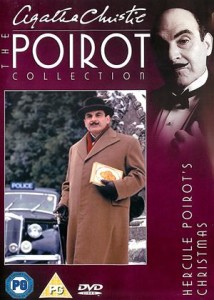 Ahhhh, an English locked room mystery set at Christmastime! What could be a better diversion on a cold winters night with snow falling outside? I had heard that this DVD was a perfectly faithful adaptation of a beloved Agatha Christie novel so I asked Acorn Media to send along copy for review.
Ahhhh, an English locked room mystery set at Christmastime! What could be a better diversion on a cold winters night with snow falling outside? I had heard that this DVD was a perfectly faithful adaptation of a beloved Agatha Christie novel so I asked Acorn Media to send along copy for review.
Now you must understand that I passionately dislike any television which involves the cutting up of a coherent whole into little scraps of material separated by commercial breaks. Though I will watch a series such as Murphy’s Law (produced by BBC Northern Ireland and aired stateside on BBC America), I will oft times mutter at the horribly bad chopping-up it suffers to stuff in as many inane, boring, and just badly produced commercials as is possible. Hell, I could come to detest even Guinness Stout after watching the same commercial a dozen times as I did during a watching of Wake the Dead, another BBC mystery series which aired at one time on BBC America.
Let me give you a brief introduction to Hercule Poirot, the Belgian detective with ‘the little grey cells’. Hercule Poirot is a fictional character, the primary detective of Agatha Christie’s novels. He appears in over thirty books she wrote and is, I believe, the only fictional detective afforded a front page obituary in the New York Times.
Poirot was born in Belgium and had worked as a Belgian police officer, but moved to England during World War I and began his career as a private consulting detective — the same career as the earlier Sherlock Holmes. Poirot is well-known for his small stature and egg-shaped head, his moustache, his dressing habits, and his almost pathological obsession with order and neatness. David Suchet, who plays him here, works for me as Poirot — a man who bears a more than slight resemblance to Oswald Cobblepot, aka The Penguin, a Batman villain! He has been played on screen by other actors including Sir Peter Alexander Ustinov and by Tony Randall, Sir Ian Holm, and Alfred Molina, but none works as well as Suchet.
Warning — spoilers follow!
Like Heinlein’s Michael Valentine from Stranger in a Strange Land, the fussy little Belgian is a perfect commentator on all things human — none of which he particularly cares for. And he notices everything with his ‘little grey cells’. So it’s Christmas Eve at a manor house of a wealthy and extremely dysfunctional family made rich by South African diamond mining — mining that was made possible by the patriarch murdering his partner who found the diamond mining site with him decades ago. Now for the first time in a very long time, the Lee family is uneasily together for Christmas. Late in the evening, a crash of furniture and a horrible squeal, quite inhuman sounding, is heard. Breaking open his locked door, they discover Simon, dead in a pool of his own blood with the room ransacked. But the windows are locked as well. Who killed him? And how did they escape?
But when Hercule Poirot arrives, for Simon had asked to come down to consult with him about something that Simon did not divulge, he finds an atmosphere not of a family in shock, but of mutual suspicion that one of them somehow murdered Simon. (It should be noted that Poirot only came down because the heat was not working in his flat. Indeed he specifically asks Simon if the manor has central heat!) As it happens, everyone in the family, and I do mean everyone, had their own reason to hate Simon, who was a spiteful bastard at the best of moments. The case is complicated by the aforementioned fact that Simon was found dead in a locked room, and the evidence, purloined diamonds and so forth, is scattered throughout the manor. Indeed several of the people involved do not appear to be who they claim to be. Will Poirot solve the mystery? More importantly, will he survive the bad English cooking? Of course!
The producers have done a nice job of subtly setting the Christmas tone, i.e. carolers are shown in the village where the manor is, and the snow definitely looks real, not like something that never existed in this reality in a natural stage. The manor house — even if it was but a mere set somewhere in a BBC production studio — is believable.
Though the novel, which is more complex than this version as several major characters get excised in this script, is prefaced by a quote from Macbeth (‘Yet who would have thought the old man to have had so much blood in him?’), I would argue that a quote from King Lear (‘How sharper than a serpent’s tooth it is to have a thankless child.’) would have been more apt.
If you haven’t seen this version of Poirot before, this makes a fine introduction to the log-running series. Trust me — you won’t regret the time spent watching this DVD!
(BBC, 1994)
